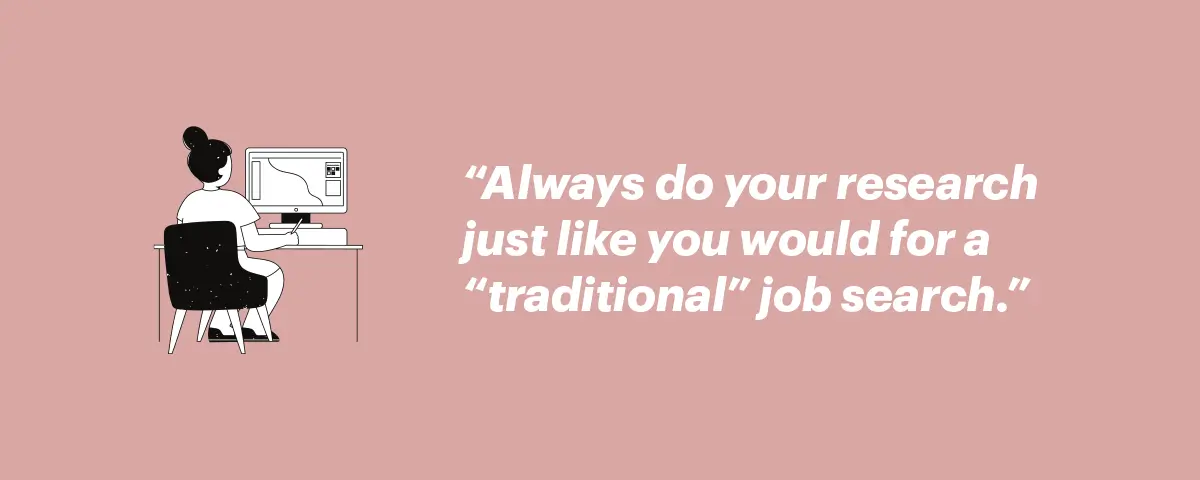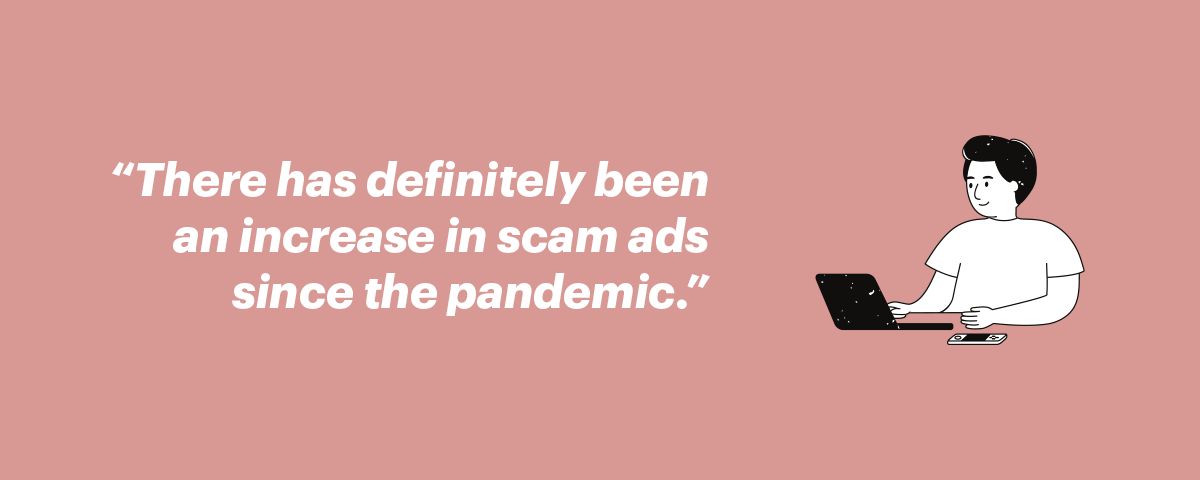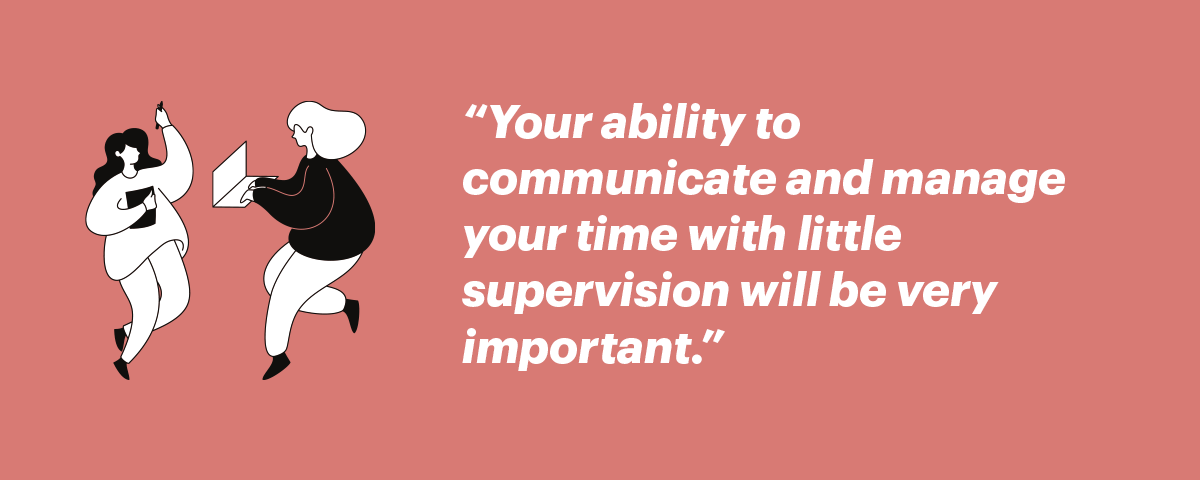Imagine you could get solid job search advice directly from someone with experience in recruiting and HR. Wouldn't that be helpful? Now you can do just that thanks to our new interview series Recruiter Reveals! Every month I interview our resident HR expert Christy Morgan on various job search topics — be it resumes, cover letters, job interviews, or anything marginally career related. |
Who wouldn't like that?
Instead of commuting to an office every day, simply doing your job from wherever you are — whether it's your couch, a chalet in the Alps, or a co-working space in Bali.
The good news is that it's never been easier to get a remote job.
But still a question arises — is looking for a remote job different from your traditional job search? And how do you make sure a company can be trusted if you don't meet them in person?
We'll talk about this with Christy, our resident HR expert, who has also been working from home for the past 11 years.
In this interview, you'll find out:
- What are the pros and cons of working remotely;
- How to find and get a remote job;
- How to spot scams;
- If it's any different from a regular job application;
- What employers look for in remote employees;
- How to adjust your resume to it;
- Why your background during video interviews is super important;
- What benefits you can ask for as a remote employee.
According to the BBC, nearly one in four Americans is expected to be a fully remote worker in a few years. What do you think are the main pros and cons of working remotely?
The main benefit is a lot of flexibility, so people can have more of a work-life blend. You're cutting out the commute, which is great. I'm not sure how many people actually enjoy travelling to work. :D You have more time to do stuff. Job seekers also have more opportunities. If someone lives in a rural community, their options are often limited because it's a small place. But if you're working remotely, you can have a job in Seattle, Los Angeles, London, or anywhere else. And as studies are showing, people are even more productive. On the other hand, companies can tap into a broader talent pool. It's really a win-win on both sides.
Some say that the main con is that if you're not with your team in person, you don't have this bond. But I don't know if that's necessarily true. People may have this bond even if they communicate via virtual calls. Obviously, it's not the same, but you still have a great bond. And you can still work effectively together as a team. Some workers don't even like the pressure of socializing. So, I think there's more pros than cons.
Let's say I'm a job seeker and I want to find a remote job. Where should I start?
There are many ways. You can start with traditional job search sites like Indeed, Monster, and LinkedIn. Filter job ads by keywords like remote work, work from home, telecommuting. On some job search engines you can also filter job ads by job type — you can have full-time remote, part-time remote, and so on. That's the main way. There are also freelance websites such as Upwork which are geared towards remote working, but haven’t necessarily emphasized this fact.
Is it better to check common job search sites or visit job search engines that specialize in remote jobs? Or do both?
You can absolutely combine both. In your job search, you should use multiple sources to find opportunities anyway. And I think there will be a bigger explosion of websites specifically dedicated to remote work.
When I find a job ad, what should I watch out for? I feel like there's more room for scams when looking for a job remotely.
Yes, exactly. Always do your research just like you would for a "traditional" job search. Make sure it's a real company. Check their website and social media, and their reviews on Glassdoor. Google your contact's name to see if they're a real person at that company, because it does happen that someone says he's a John Smith from Amazon but if you google them, this person doesn't exist. Check that their contact details match the real person’s. And if you're not quite sure, find the main number on the company's real website and ask to be put through to your contact. That way you can check whether you're dealing with the right people and it's a real role.
Some job ads are even falsely advertised — they promote it as remote work but at the interview they tell candidates they'd have to come to the office twice a week.
Yes, it would be an orange flag for me. And yes, this is possibly false advertising. On the other hand, we're still trying to define what remote working is. Of course, we had remote working before the pandemic, but it wasn't the norm like it is today. So, we're at the stage when companies are considering whether they should go back to the physical office or not, and whether they should hire people outside of their location, and so on. So, there's a lot of flux going on and many companies are still trying to figure this out. Sometimes, they may not know how to clarify that in the job ad. So, maybe it's misleading, but maybe not 100% intentionally.
One of my clients who's looking for remote work came across ads that said they're looking for remote workers. When they clicked on the ads, the company specified that once the pandemic is over, the staff will come back to the office. So, there's also that too.
So I recommend reading the fine print carefully. It’s also worth clarifying the company’s intentions at interview stage, if it’s not brought up before then.

What else should I watch out for?
There has definitely been an increase in scam ads since the pandemic. But I think it’s the same as with any other job ad: if it seems too good to be true, it probably is. Also, look at things like language, grammar and spelling. Scammers often give themselves away with poor attention to detail. And if the job is for a big company and they're approaching you directly, it's not normal. Unless you previously registered with them, they're not going to randomly email you like “Hey John, we've got an amazing opportunity for you.” So, use your instincts. For instance, if they say they’ll send you a check for remote office equipment, it's a scam.
What else can job seekers expect to be different during the remote job application process?
Mainly that the interview is done virtually. So, you may not get the chance to see the office, the people, and so on. That's why you should thoroughly research the company and make sure it will be the right culture fit for you, even virtually. Ask questions about their culture, and how they approach communications and team engagement with remote workers.
Because you're going to work remotely and at some point, you'll feel that you're kind of isolated. So, how does the company deal with that? How do they interact with remote employees? What's onboarding like? Do they provide you with any equipment? Do they have virtual check-ins to see how you're doing? Ask a lot to see how they support remote employees.
What do employers look for in remote employees? Is it any different compared to regular employees?
Generally it’s the same as in-person roles: they're mainly looking for someone who meets the job requirements and is a good culture fit. In addition, your ability to communicate and manage your time with little supervision will be very important. The rest really depends on the role. For instance, if you're looking for a technology job, they might look for employees who have the equipment needed so you can do the job. Location may be important to some companies too. I see a lot of remote working opportunities now where people are being hired from abroad, but for some companies it may be a restriction.
They also might do reference checks a little more thoroughly. Because if they're not going to meet you necessarily, they also want to know that you are who you say you are, and that you're a good employee. Communication will be more important to them too because it's a huge part of remote working. How you communicate, how quickly you respond to them, and so on.
But otherwise, it’s not significantly different from what they look for in a traditional employee.
How can job seekers prepare their resumes for remote job search?
That's a great question. Of course, employers will still be interested in your experience. That's not going to change. But if you have experience working remotely, put it in there. Also mention in your resume summary that you're used to working remotely. Mention also technology skills and platforms you're familiar with, like Microsoft Teams, Zoom, Skype, and any other platforms that are used for remote work.
Should they also mention relevant soft skills like time management, communication, or flexibility?
I normally don't put soft skills on resumes. Mainly because they're subjective. You may say you're well organised, but your previous manager may say something completely different. So, it's quite subjective and a lot of this stuff is given anyway. You can for sure mention a soft skill in your cover letter if it’s a requirement in the job description. But in the resume I'd advise you to maximize the little space you have by focusing on the objective stuff: experience, skills, qualifications. Soft skills can be quite generic and don’t necessarily add much value to resumes.
And what if job seekers don't have experience with remote work yet?
What I would do is not mention it and let them assume it's a given anyway. But most people, even if they're not working remotely, have experience with communicating remotely. So, make sure you highlight those remote technology skills and put emphasis on that. Also, if you're dealing with customers and clients virtually or over a phone, mention that in your resume too. It's not exactly working remotely with your company, but it shows you're familiar with virtual communication.

With remote hiring there's also a big con that more people can apply for a single job. How can I stand out amongst bigger competition?
That's true, but this is more of a problem for recruiters, because they’re the ones having to deal with more job applications. But I think we're still going to have the same average of suitable applications, just a higher volume. Let's say you have a typical job posting and you get 250 applications. Probably 15 of those are going to be somewhat good, maybe 5 are pretty good, and 3 are excellent. So, I think that ratio is going to stay the same. It's just more work for recruiters, especially if they don't have an ATS system. On the other hand, you can apply for more roles too. I think it balances itself out.
But how do you make sure that you will still stand out?
It's always going to be the same. Making sure that you're a good fit, that your resume reflects what they're looking for, that all important keywords are in there. If it's a remote role and you have experience, make sure to mention that. Emphasize your technology skills and include bullet points on how you communicated remotely. But as always, the more closely you match what they're looking for, the more likely you'll get an interview.
In one of our episodes, we discussed a few tips for virtual job interviews. Can you sum up the key takeaways?
This is when your communication skills and ability to present yourself well are really important. Because the interviewer can't see you as a whole, they can’t fully see how you dress, how you sit, or how you engage with others in person. They can't smell your perfume or see the condition of your shoes. They simply don't have these physical inputs we normally do to get a feeling for someone.
Be very clear with your communication style and be very well prepared. Make sure your background looks appropriate, as it's also a part of your presentation now. Companies will see this and think this is how you'll present yourself to their clients or other stakeholders. So, I advise you to really put some effort into that. For instance, I was doing practice interviews with one of my clients who is a counsellor. She chose a corner of a room with books and a really nice picture in the background. She took the time to think about her background as an extension of who she is as a professional. It really impressed me.
Also, dress appropriately. Of course, they can't see if you're wearing pyjama pants, but at least make sure that the top part is presentable. :D Look directly at the camera, not at your notes. But the magical ingredient is very good preparation, because that will give you confidence.
What would you, as a recruiter, notice first when conducting a remote job interview?
First thing I'll be looking at is probably the chosen background. Then I'd look at the person and how they present themselves. Then how they communicate, whether they seem confident, if they’re looking at the camera and not somewhere else on their screen.
What remote-specific job interview questions should I prepare for?
I don't think they'll be significantly different from traditional job interview questions. They will probably ask about your experience working remotely and about any remote technology skills.
But what may be almost more important are the unspoken indicators. For instance, did you enter the meeting on time? Did you have issues with technology because you didn’t test it first? In a previous interview, I mentioned one of my senior clients who had trouble connecting to the job interview. The company decided not to proceed, because they saw it as evidence of his ability to use technology and general preparation skills. Even if you're not applying for an IT job, companies expect you to be tech-savvy. So, testing everything in advance is a vital part of your preparation for a virtual job interview.
What things should I pay attention to during the job interview?
Use the interview to determine whether it's a company you really want to work for. Because when you’re working remotely, you need to rely on them much more for support. So, look at how they communicate with you. Were they on time? How do they present themselves? How do they communicate with you when they're not talking?
For instance, one of my clients had a panel interview where the main interviewer was asking questions and the others were on their phones, not paying any attention. And that's rude. I’d totally consider that a red flag. So, look at things like that too.

What remote-specific questions should I ask at the end of the interview?
What policies and procedures does the company have for remote workers? How do they support them? How regularly do they check-in with you? What do they have in terms of mental health and social bonding initiatives? Try to find out how they treat remote employees.
I imagine it cannot hurt to also ask whether you'll work independently or in a team, how you should communicate, and whether they're based in different time zones.
Yes, for sure. For example if there's an issue on the team, who should you communicate with? When should you communicate with clients or team mates? Also, what are your expected working hours? Will you work 9-5 or later in case your teammates are located in different time zones? How does it work right now and what's the communication like within the team? You can for sure ask questions about how they manage different time zones if relevant.
I also feel like it's more common to get ghosted when applying for a remote job. What's your take on this? And what to do in such a case?
I'm not sure about the statistics on this, but it would be interesting to see. In general, I'd say that people who typically ghost are going to do it anyway, whether it's an in-person job or a virtual one. If it happens to you, try to follow up once or twice, maybe also with somebody else from HR. If you're still not hearing back, that's when I'd focus on other job opportunities.
When I decide to take the job, what main points should I consider? Can I still work as a regular employee or do I need to be self-employed?
It really depends on the job. There's a lot of contract work now, because it's easier for companies to outsource, but you still have the employee option. It really depends on the position and the company. So, the only difference might be that you wouldn't necessarily sign the contract in person. You might do it virtually, using a tool like DocuSign. But other than that, I don't think there'll be too much of a difference, aside from an increase in contractors and freelancers. Here's when you definitely need to make sure that it's a legitimate company.
Are there any benefits that remote employees can ask for?
You can ask if there’s any support in terms of equipment. And if you're working from home, how is it compensated? Maybe your salary is increased to compensate for saving them money on their utilities, and you having to pay for that yourself. The thing is that many other benefits these days are only nice-to-have perks that aren't a part of your contract. I’m talking about things like free snacks, entertainment areas, paid team events, bringing your dog to work.
At the same time, people have come to expect these and see them as benefits, not perks. So companies are trying to find ways to offer perks remotely. I do hear about companies setting up wellness packages for remote employees. Or breakfast with the team, delivered to each person’s home to share online together. Or employees getting surprise care packages. So, yes, companies are doing these things, but it's not exactly something you can demand. It goes back to asking how they support remote employees and seeing what they say.
Apart from the equipment benefit, could you also ask for more paid vacation or sick days for mental health? I've seen somewhere that Doist is offering this to their remote employees.
Yes, exactly. For instance, one company recently gave its 700 employees a spontaneous paid week off. I wouldn't say it's expected for companies to do this, but many of them realize it's a good thing to do for their remote employees. And it also significantly contributes towards retention and team dynamics.
Key takeaways: How to get a remote job
- Know where to look for it: Start with traditional job search sites like Indeed, Monster, and LinkedIn. Filter job ads by keywords like remote work, work from home, telecommuting. You can also check freelance websites such as Upwork.
- Do your research: Make sure it’s a real company. Check their website and social media, and their reviews on Glassdoor. Google your contact’s name to see if they’re a real person who works at that company.
- Edit your resume: If you have experience working remotely, mention it. Don't forget to also include any key technology skills and platforms you’re familiar with, like Microsoft Teams, Zoom, Skype, and any other platforms that are used for remote work. If you’re dealing with customers and clients digitally or over the phone, mention that too.
- Prepare for a virtual job interview: Stick to a clear communication style and be very well prepared. Make sure your background looks appropriate, as it’s also a part of your presentation. Dress appropriately and look directly in the camera, not at your notes.
- Ask remote-specific questions: What policies and procedures does the company have for remote workers? How do they support them? How regularly do they check-in with them? What do they have in terms of mental health and social bonding initiatives?




